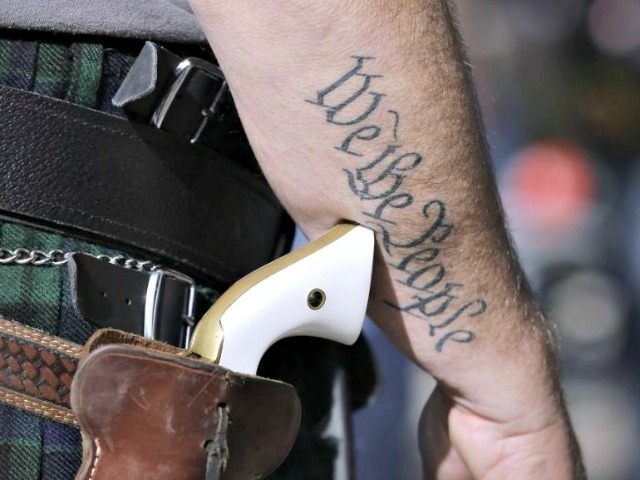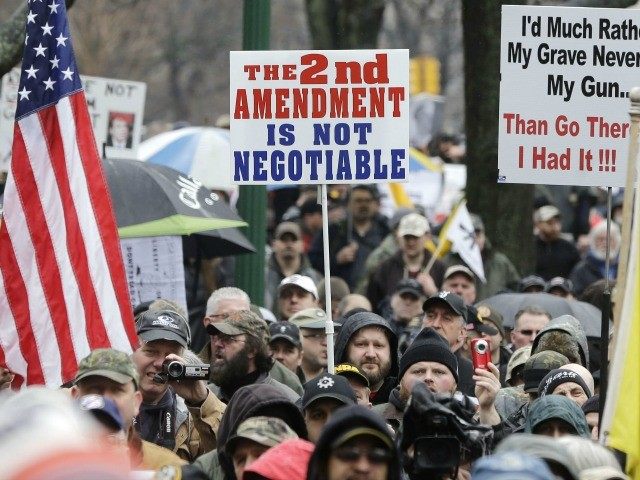What if you could go to church only if you could prove to a government functionary that you had something important to pray for?
What if you could post on social media only if a government censor first agreed you had something valuable to say?
That would be crazy, right? Even with the ascendancy of the woke left, you’d never see laws like that. They would clearly be unconstitutional restrictions on your First Amendment freedoms.
But all over America, the left has passed laws just like that to hack away at another of your constitutional rights—your Second Amendment right to bear arms. Even worse, most federal courts have upheld these laws as constitutional.
Now the United States Supreme Court is about to weigh in. The case the Court is hearing, New York State Rifle & Pistol Association v. Bruen, is the most important Second Amendment case in more than a decade. It has been years in the making, and your right to carry a firearm outside the home hangs in the balance.
The Supreme Court will hear oral arguments in Bruen on November 3. So, I will be writing a series of pieces over the next week to explain why the case is so important and what key issues the Court will be deciding.
What’s the law being challenged in the Bruen case? It’s a so-called “may-issue” law in effect in New York State.

A supporter of open carry gun laws wears a pistol as he prepares for a rally in support of the legislation at the Capitol, in Austin, Texas. (AP pic)
“May-issue” laws require law-abiding citizens to convince state licensing officials that they really need to carry a firearm before they can receive a license to carry a firearm in public, and before they can exercise their right to bear arms. These laws are sometimes called “proper cause” laws in that you, the citizen, must prove “proper cause” to the government before being allowed to carry. Laws like this exist all over Blue America, including in California, Massachusetts, New Jersey, Maryland, and Hawaii.
Again, state governments would be laughed out of court if they tried to say you have to show a justifiable need before exercising your free-speech rights. But incredibly, most federal courts have upheld may-issue laws. It doesn’t seem to matter that in the 2008 Heller decision, the Supreme Court affirmed that the Second Amendment protects an individual right to keep and carry firearms.
Why does the Bruen case matter so much for your Second Amendment rights? Simply put, if you have to ask the state, “Mother, may I,” then you’re no longer talking about a right at all. You’re talking about a privilege that government bureaucrats have the power to bestow on you—or not.
Joe Biden’s administration definitely understands how much is at stake here. Although no federal laws are at issue in Bruen, Biden’s lawyers asked the Supreme Court for permission to argue in support of New York’s restrictive gun law. And the Supreme Court has given Biden’s team exactly what they asked for. So, on November 3, Biden’s attorneys will get almost as much time at oral argument as the State of New York.
The Supreme Court justices know how much is on the line, too. Despite the outrageousness of may-issue laws, until this year, the Supreme Court refused to consider cases challenging those laws. In June 2020—less than a year before agreeing to hear Bruen—the Court rejected a similar case out of New Jersey called Rogers v. Grewal. The Court did this despite the fact that in 2017 the federal court of appeals for the District of Columbia broke from other courts and struck down D.C.’s may-issue law. Keep in mind, one of the Supreme Court’s main jobs is to resolve such “circuit splits,” when federal appellate courts issue conflicting rulings.
So, what changed between last year and this year? For one thing, in October 2020 Justice Amy Coney Barrett replaced arch-liberal and reliable anti–Second Amendment vote Justice Ruth Bader Ginsburg. That appears to have moved the Court from a tenuous 5–4 originalist advantage to a more robust 6–3 advantage.
Perhaps, before Justice Barrett’s confirmation, the so-called conservative justices thought that they could not rely on Chief Justice John Roberts to interpret the Second Amendment as written.
Second Amendment victory! The Illinois Supreme Court ruled 6-0 Thursday that Cook County's tax on guns and ammunition violates the Second Amendment. https://t.co/EX8ijAtQRk
— Breitbart News (@BreitbartNews) October 22, 2021
Here’s another sign of how high the stakes are in the Bruen case: The Supreme Court has been inundated with dozens of briefs from groups on both sides of the issue. Those who support New York’s law include a who’s who of the American establishment. Briefs have come from groups like the American Bar Association, the American Medical Association, and the ACLU—providing further evidence that many in the establishment want to reduce, or eliminate, your right to defend yourself with firearms.
Plus, as we’ve seen, the Biden administration’s top lawyers have jumped in. This is all further proof that many of America’s elites oppose the citizen’s fundamental right to keep and bear arms for self-defense or any other lawful reason.
So, the stage is set for a monumental showdown on November 3. Will your constitutional right to bear arms outside the home survive the anti-gun crowd’s relentless attacks? Stay tuned to find out.
Because so much of the process is buried in legalese and Supreme Court protocol, I’ll be guiding you through the key issues in the case, including the legal tests that could apply. Over the next few days, I’ll also dig into the historical arguments at play and the potential public safety implications of the Supreme Court’s decision.
And, as part of my effort to provide more in-depth analysis on Second Amendment scholarship, legal matters, news and issues, I’ve started a YouTube channel, The Four Boxes Diner based upon the “four boxes of American Liberty”—soap box, ballot box, jury box, and cartridge box. One of my earliest videos discusses what to look for in the NYSRPA v. Bruen case.
*Attorney Mark W. Smith is a Presidential Scholar and Senior Fellow in Law and Public Policy at The King’s College, a New York Times bestselling author, and host and producer of The Four Boxes Diner channel on YouTube.

COMMENTS
Please let us know if you're having issues with commenting.